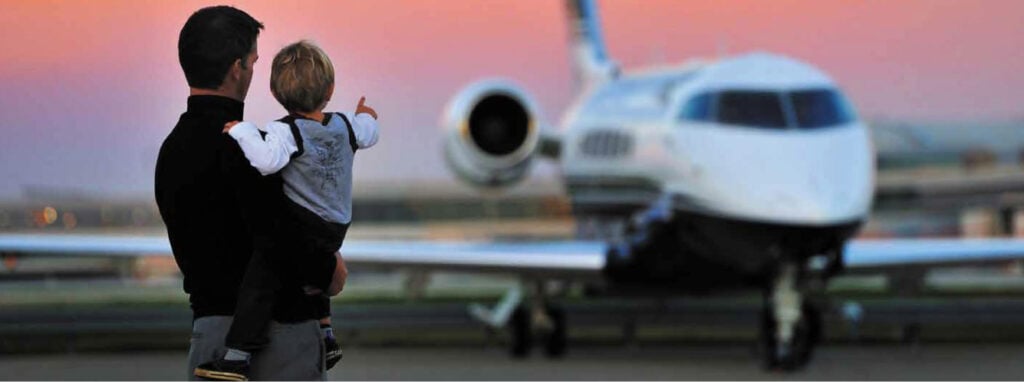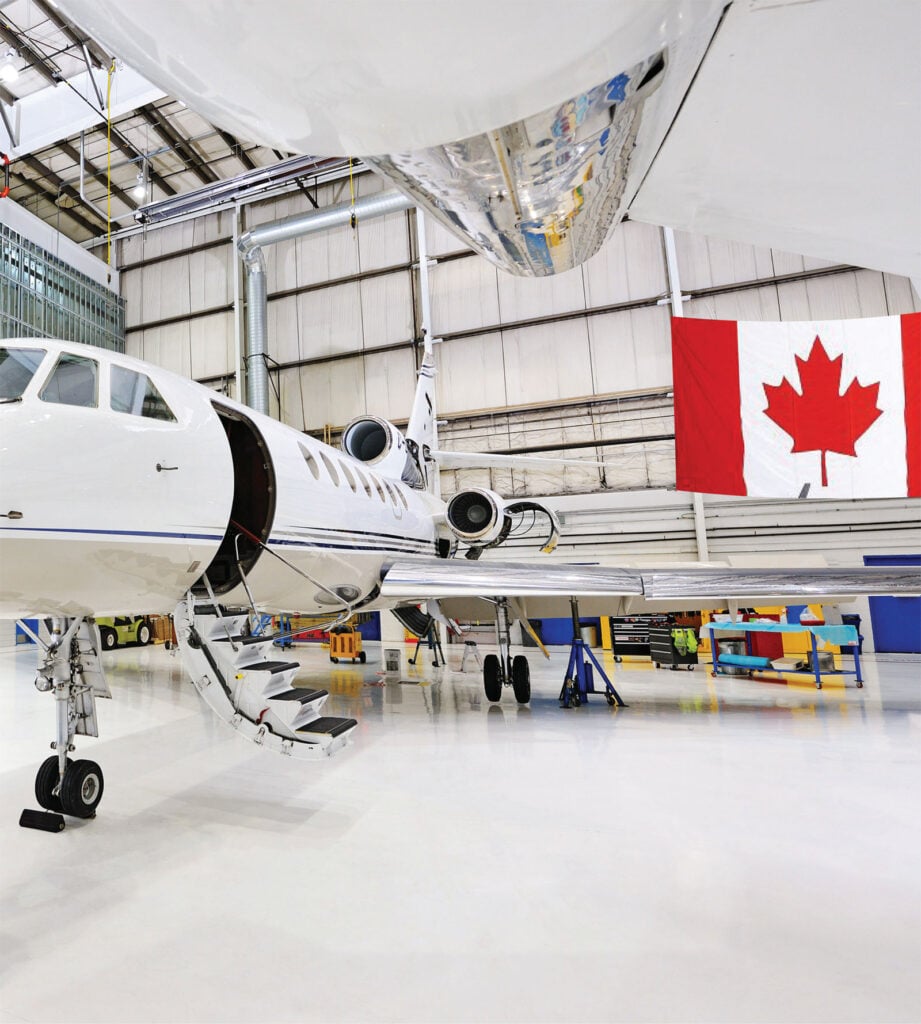Following InstarAGF’s admission to the PRI, we caught up with Skyservice™, Canada’s leader in business aviation, to learn more about how this business fulfills its commitment to stakeholders.

Founded in 1986, Skyservice is the only fully integrated business aviation services company in Canada.
It operates three complementary divisions: fixed-base operations; aircraft management and charter services; and aircraft maintenance. Skyservice manages the largest fleet of aircraft in the country and forms an important part of Canada’s aviation infrastructure network.
Paul Weeks (VP, Maintenance) and Simon Roussel (Director, Flight Operations) are responsible for ensuring world-class service and the highest levels of safety and security across Skyservice facilities in Calgary, Toronto, Ottawa and Montréal.
Congratulations on your ranking of Platinum from the Aviation Research Group/ US. What does receiving North America’s most demanding rating for operational safety mean for Skyservice?
Paul Weeks: It is a great achievement. Skyservice is committed to excellent customer service and ensuring there
is seamless transition from when the customer arrives to when they leave and everything in between. We want our customers to say they will be back, and to tell other people about the great service they received while at Skyservice. This ranking shows we are on the right track.
Simon Roussel: Skyservice has an exceptional Safety Management System (SMS) in place that identifies hazards,
conducts risk assessments, mitigates risks and continuously improves all operational areas of the business creating a proactive safety culture.
Organizations such as ARG/US have put in place operational standards that are beyond and above what our regulator (Transport Canada) is requiring. Those standards are safety oriented and best practices.
PW: When you are measured to the highest standards, it opens a lot of opportunities. Companies can use the Platinum rating to automatically approve us for charter – it sets us apart from our competitors.
“When you are measured to the highest standards, it opens a lot of opportunities”
– PAUL WEEKS
Skyservice has been recognized as having an exceptional aviation safety record since 1986. Over the 20+ years you have been with Skyservice, how have you seen the business change? How have safety and security evolved in the industry?
PW: Customer expectations are much higher than they were 20 years ago. Transport Canada’s Safety Management System program validation audits have also become more operator focused, requiring increased self- disclosure and transparency. Safety is the company culture, and it starts at the top: floor-level employees are made more successful by teams that aim higher than the minimum standards, and place a clear emphasis on safety.
“Over the years, operators have had access to more and more data coming from the aircraft itself…The evolution of safety and security never ststops” – SIMON ROUSSEL
SR: Safety and security are the core values of any flight operator. Over the years, operators have had access to more and more data coming from the aircraft itself. Flight Data Monitoring programs play a big part in the evolution of safety, working alongside the Safety Management System.
With new technologies, aircraft investigations are able to be more and more accurate, providing extremely useful information to authorities as they seek to address processes or mistakes with the right regulations. The evolution of safety and security never stops!
Managing the largest, most diverse fleet of aircraft in Canada, how does Skyservice provide safety, security and privacy to customers?
PW: Training is a key part to safety with our maintenance technicians. We spend over $1 million dollars a year on training, additionally ensuring our technicians take the engine run and taxi course. This is
another differentiator from our competitors.
SR: Transport Canada’s training program requirements are among the most demanding in the world. Our pilots have mandatory training every year through the training providers that we work in conjunction with (Bombardier, CAE and Flight Safety International). Those organizations provide type-specific training for ground school and flight simulators. Our training program is quite complex, covering around 30 different aircraft types.
PW: Every employee must also pass a security background check in order to receive their airport pass. Customers are able to get right into their vehicles from the aircraft to avoid any confrontations or media. For certain high profile people, we work with all the local police departments to facilitate a smooth transition through our facilities.
Can you provide a bit more detail on Skyservice’s internal Safety Management System, and what it has done for the culture of safety at Skyservice, both for customers and for employees?
PW: Our Safety Management System has been in place since 2001, well before the mandatory requirements set out
by Transport Canada in 2005. It has increased our overall safety by promoting a non-punitive reporting structure and culture companywide.
SR: Ensuring customers and employees feel safe is a top priority. For Skyservice, this means securing both the physical environment at our facilities, and the reporting protocols put in place to track potential hazards or concerns. Over time we have seen the difference this strong, holistic approach to safety can make, building long-term trust and confidence that action will be taken by the company to mitigate any risks.
PW: We recognized that in order to grow the business we needed to use technology to our advantage. We needed a system that was easily scalable to keep up with our growth and a system that would automate reporting and analysis. Skyservice has recently invested in a new SMS system from Rolls Royce that will be cloud based and will automate many of the manual processes we do today. This system can also be used for internal audits on our operational areas of the business, building reports and analyzing the data automatically.
We are currently in the setup phase of implementation and hope to have the system operational around February 2019. This is a large investment to make, and really shows Skyservice’s commitment to go above and beyond, building on a foundation of safety and service excellence.
“Skyservice’s training program is quite complex, covering around 30 different aircraft types.”
– SIMON ROUSSEL
PW: Aviation has always been behind the technology curve. Technology is catching up to the aviation industry and being able to monitor a complete aircraft in real time while in the air opens up a lot of new innovation for manufacturers. Older, less efficient aircraft will be phased out and replaced with the newer technology and more fuel efficient aircraft. Regulations will continue to expand into mandatory requirements worldwide as air traffic continues to increase.
SR: There is definitely more and more investment done in order to make the aircraft “connected”. While there are benefits on the entertainment side – you can now stream movies, do emails from the aircraft as you would from your office – it also adds new safety benefits. Aircraft manufacturers are coming up with technology to help pilots manage risk by increasing situational awareness and accuracy.
“We recognized that in order to grow the business we needed to use technology to our advantage”
– PAUL WEEKS
For example, we now have the technology to allow a flight, from take-off to landing, to occur without the pilot touching the controls. Enhanced Vision System (EVS) is another system that provides support to pilots, giving them sight in cloudy or foggy conditions as if the sky was clear. We are also seeing systems that can tell pilots if they are lined up on the right runway. In fact, the FAA stated that jet pilots are currently performing just 30% of the flying, with automation taking over the rest.
PW: Continuous improvement with maintenance practices is an ever evolving process. By attending trade shows and participating in industry events, Skyservice stays on top of the available technology and trends in the industry.

Paul Weeks, Vice President of Maintenance, Skyservice
Paul’s leadership has helped shape one of the leading business and commercial aviation maintenance facilities in Canada, more than doubling maintenance revenues through operations at a number of bases since 2013. With experience as a flight engineer and extensive knowledge of maintenance, operations and safety management, Paul is uniquely positioned to continue Skyservice’s growing maintenance, repair and operations (“MRO”) business.

Simon Roussel, Director, Flight Operations, Skyservice
Simon is responsible for the flight operations of the entire Skyservice fleet, currently holding one of the best safety records in the Canadian private jet industry. With more than 30 years in the aviation industry, Simon’s expertise in aircraft safety, protocol compliance, and flight operations oversight has driven Skyservice’s reputation for quality service and leading safety standards. Drawing on experience as an aircraft dispatcher, Simon has worked closely with flight coordination and aviation operations throughout his career.
[s_download url=”https://www.skyservice.com/wp-content/uploads/2019/02/Maintaining-great-heights-Skyservice-Dec-2018-Eng.pdf” text=”DOWNLOAD BROCHURE”]
